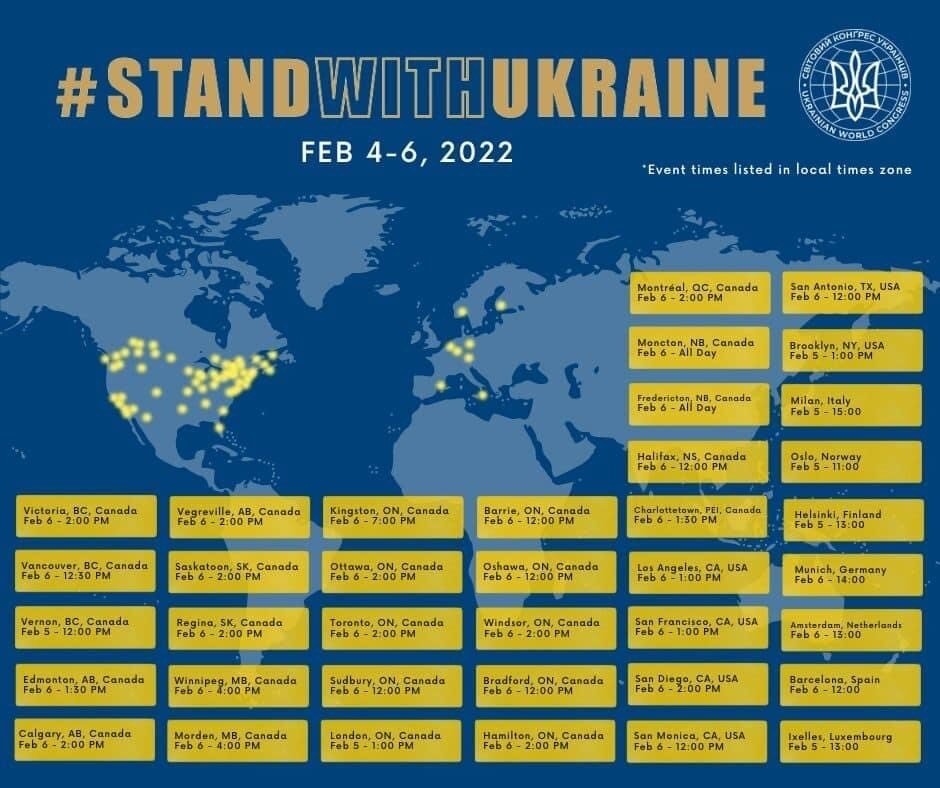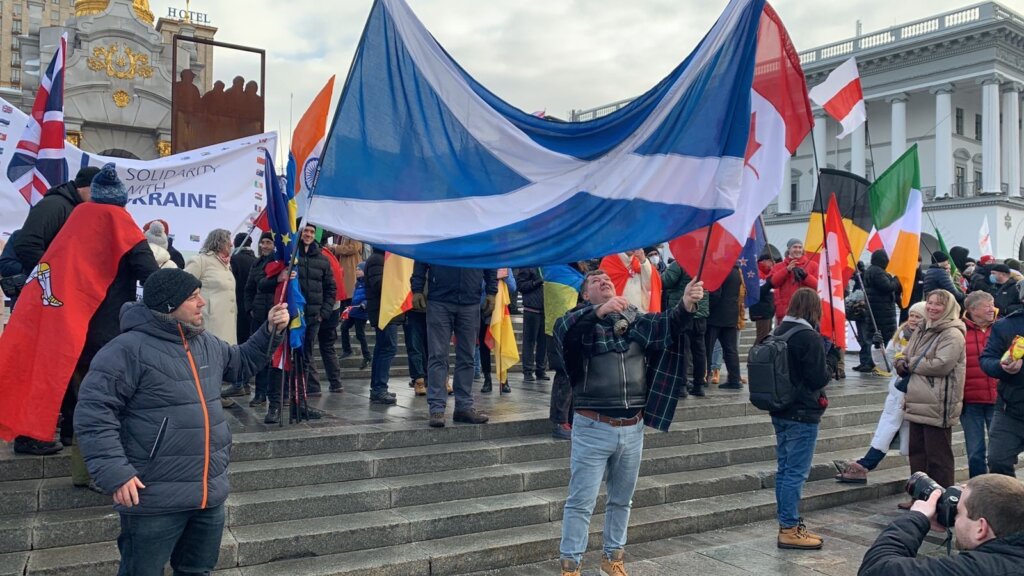Kyiv’s vibrant expat community held a march to support Ukraine as it withstands increasing Russian aggression. The International Unity March for Ukraine coincided with a large rally in Kharkiv the previous day and worldwide acts of support on Feb. 4-6 organized by the Ukrainian World Congress (UWC).
Several hundred foreigners from at least 40 countries, as well as Ukrainians, assembled at Shevchenko Park in Kyiv on Feb. 6 before walking down the hill toward Independence Square where they sang the Ukrainian national anthem.

: A graphic showing 34 rallies in support of Ukraine held on Feb. 4-6 in North America and Europe organized by the Ukrainian World Congress
The march was staged amid fears Russia might further invade Ukraine. Some 130,000 well-equipped Russian troops and hardware are stationed close to Ukraine’s state borders, in addition to forces deployed to neighboring Belarus for military drills taking place on Feb. 10-20.
“The aim of the march is to show the people of Ukraine that the rest of the world stands behind them in the face of this further Russian aggression,” co-organizer Stuart McKenzie, 51, of Scotland told the Kyiv.
Another co-organizer, Irishman Paul Niland, a writer, commentator and founder of a suicide prevention call center, said that beyond displaying solidarity with Ukraine, “the purpose of the march was to object to whatever else Russia wants to do and invade in Ukraine.”

Scotsman Stuart McKenzie, a co-organizer of the International Unity March for Ukraine, holds a Scottish flag on Independence Square in Kyiv on Feb. 6.
Russian forces already occupy 7 percent of Ukraine’s territory, having forcibly seized the Crimean Peninsula and certain a parts of the easternmost regions of Luhansk and Donetsk in 2014.
More than 14,000 people have been killed in Europe’s only current shooting war, which has internally displaced over 1 million people. “We came from all over, including Ukrainians from America, Canada and Australia,” McKenzie said.
Danishman Johannes Andersen, a freelance journalist and human rights investigator who has lived in Kyiv for 20 years, said he joined the march with his two children “out of a feeling of powerlessness facing unbelievable cynicism and aggression from Russia.” He took his kids with him “because I want them to learn to stand up for their rights.”

Dane Johannes Andersen (center) holds a Danish flag accompanied by his children during the International Unity March for Ukraine, in downtown Kyiv on Feb. 6.
The main message, as the group marched, Niland said, was “to show Ukrainians they are not alone, that the international community is with them as well.”
Along with Englishman Sean Kietly, McKenzie and Niland have organized such marches since the pro-democratic EuroMaidan uprising in 2014 that overthrew Viktor Yanukovych, an increasingly authoritarian, pro-Russian president who fled to Moscow.
They also assembled when Russia was illegally annexing Crimea that year and marched in 2015 on the first-year anniversary of the downing of flight MH17 – a Malaysian airliner that Russian-armed formations shot down using a sophisticated surface-to-air missile supplied by Russia.

The main banner of the International Unity March for Ukraine.
Three Russians and one Ukrainian are on trial in absentia on murder charges in the Netherlands over the death of all 298 people aboard the plane, which was shot down in Russian-controlled territory of eastern Ukraine in July 2014. All four have denied involvement.
In Kharkiv, Ukraine’s second largest city located just 40 kilometers (25 miles) south of the Russian border, some 3,000 held a “unity” march in the center on Feb.5.
They carried a 100-meter blue-and-yellow national flag and slogans “Kharkiv is Ukraine” and “Glory to Ukraine! Glory to Heroes.” The marchers’ route ended at Freedom Square. Here, participants sang the national anthem and honored the memory of Kharkiv residents who were killed in the EuroMaidan Revolution and the war in the Donbas. Kharkiv’s city council opposed the demonstration but twice lost two court motions to ban it.
A council commission on technogenic and environmental safety and emergencies recommended the rally not be staged over concerns related to the COVID-19 pandemic. It also argued that Kharkiv remains in the “yellow” zone of terrorist threats – the second most severe warning when such threats are “probable.”
In a recent interview with the Washington Post, Ukrainian President Volodymyr Zelenskyy said Kharkiv would most likely fall should Russia further invade the country. Also over the weekend of Feb. 4-6, the UWC, a coordinating body of Ukrainian communities representing over 20 million Ukrainians, organized 34 “Stand with Ukraine” rallies in North America and Europe.
They were held coast to coast, from Los Angeles to New York. In Europe, Helsinki, Milan, Barcelona and Oslo were some of the staging grounds for rallies of support.
